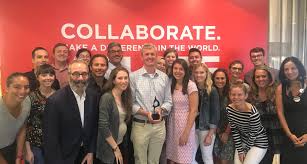Beyond the Paycheck, Speak to Why the Work Matters.

Engaged volunteers who feel that their efforts matter – that they are changing and improving people’s lives – often contribute more and stay involved longer. I’ve been part of several outstanding third-party health groups during the past three decades, such as the American Heart Association and Marfan Foundation. These organizations, worthy of our attention and support, have served as unintended training grounds; they demonstrate how “bigger than one person” aspirational goals can influence positively how company employees experience their workday.
People matter – and they must know it! Beyond impacting collective productivity, the experience of belonging and being part of something greater, influences their ability to navigate challenge and stay engaged when the going gets tough. Great employees are essentially paid volunteers. Partners in the work, they should feel connected to the company by more than an employment agreement. Emotion and meaning inspire. Yet, these are underrated as compensation factors.
Understandably, successful companies are judged through economic filters acceptable to owners and shareholders. Guess what? Good economics is not enough to sustain performance. Successful start-ups often operate in the red until they turn the corner and become priceless “unicorns.” Ideas, values and culture drive people and are as important as economics when developing high-performing, productive cultures.
Naïve thinking for business leaders? Not at all. How many of the best employees announce their departures, suddenly, because of poor interpersonal relationships, insufficient appreciation or the feeling that their leaders do not “walk the walk” on company values? On the other hand, engaged employees feel safe and will speak up when facing a personal money matter or when something that touches their hearts is bothering them. Company leaders and their employees need to recognize that values and business objectives are inseparable. Both are key to creating a culture that ensures both workplace satisfaction and high performance.
Here are my “musts” in building high-performing cultures that transform workplace stress into power performance:
- Remember people want to contribute and have fun. Work is not a burden. You don’t have to live by the adage, “That’s why they call it work.” On the contrary, seek to abide by the business leader, Peter Finn, who ascribes to the “work hard and play nice” theory. As leaders or community members, remember that your response to stress and anxiety is like a domino. Be transparent, but don’t feel that if you’re kicked, you must pass the pain along. You have a choice in how you react! Just let people know what’s happening; you’ll often find that empathy is their natural response.
- Respect people’s ideas and approaches. Diversity extends beyond race, religion and physical ability. Inclusion makes people feel safe and engaged. It does not pit people against each other or against the enterprise. Mutual respect is needed to elicit the diverse opinions that lead to bigger ideas. When people lose that understanding and respect, leaders must step in fast and set parameters that honor everyone’s points of view.
- Make it possible to work together in harmony. Collaboration isn’t just a concept. It’s a process that needs to be supported – whether through resource allocation, budgets or incentives. People are collaborative intuitively; however, too often, office structures beat collaboration out of the process. If you want to get the most out of your workplace community, make it possible for people to participate, help each other and share ideas quickly.
- Make the workplace safe, but don’t always play it safe when making big leaps forward. Everyone should feel that coming to work and sharing ideas is comfortable – that their suggestions are sought and welcome. However, it’s okay to take risks. Many organizations are risk averse. Often, staff at these companies stifle other’s good ideas to a point where the best and brightest leave to be bold elsewhere. Leading takes courage, including the courage to champion new ideas.
- We need a paycheck to pay our bills. We need to make a difference to sustain our emotional wellbeing and soul in the workplace. Fuel idealism! Enable people to see the fruits and meaning of their labor. Most forms of work – whether in the service field or administration – can become tedious. As a leader, colleagues take their cue from you! If you retain your fire for making a difference, they will find keep their fires burning, too, avoiding the burnout that often occurs when work is divorced from its meaning.
As you seek a great job that taps your inner desire to perform and be productive, ask questions about workplace culture and mission long before considering an offer of employment. Your paycheck will pay your bills for sure, but after a few direct deposits, you will be thinking about what will fuel your heart and soul.

